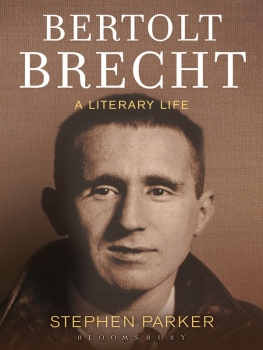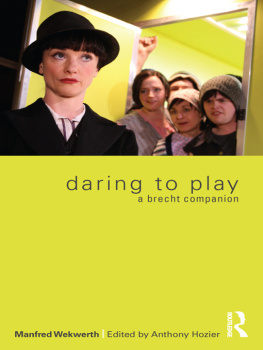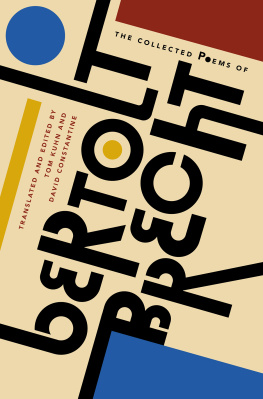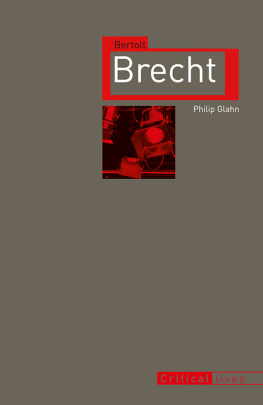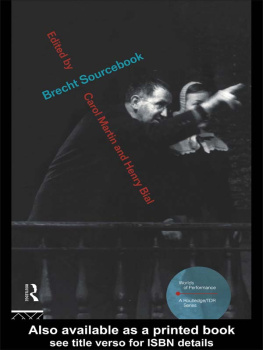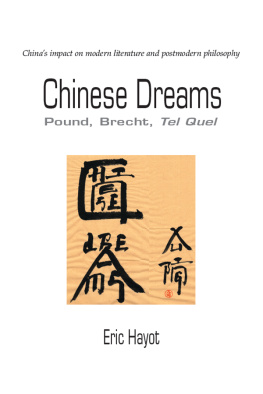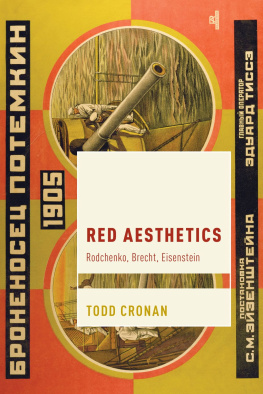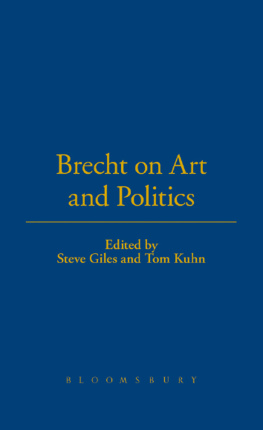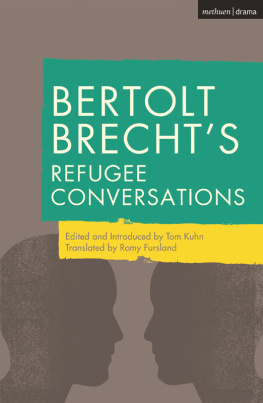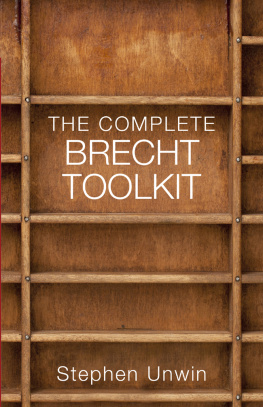Bertolt Brecht
Collected Plays: FourRound Heads and Pointed Heads,
Fear and Misery of the Third Reich,
Seora Carrars Rifles, Dansen,
How Much Is Your Iron?, The Trial of Lucullus Volume Four of Brechts Collected Plays contains works from the 1930s, straddling fateful years in German political and cultural history as well as in Brechts own life. Round Heads and Pointed Heads started out as a radical adaptation of Shakespeares Measure for Measure. Brecht developed this into a powerful political allegory on Nazi race policy and conditions in the Germany which he had to leave in 1933. It was first staged in a small theatre in Denmark, to music by Hanns Eisler. Fear and Misery of the Third Reich is unique in Brechts work. It consists of some thirty short scenes of life under the Nazis between 1933 and 1938 designed for use by groups in exile with little in the way of staging.
The scenes are realistic, based on reports from inside Germany, but strung together on a long rhythmic poem to create a montage of anti-Nazi sketches. Seora Carrars Rifles is a short play about the Spanish Civil War, based on J.M. Synges Riders to the Sea. First staged in Paris in 1938, it was widely performed in the months leading up to the Second World War. The other two short plays, Dansen and How Much Is Your Iron?, were minor works designed for amateurs in Scandinavia, where the Brechts lived till spring 1941. The Trial of Lucullus is a radio play, in which the Roman general is tried by the Underworld for his military triumphs.
It was first broadcast by Swiss radio in 1940, then performed in H.R. Hayss translation at Berkeley in 1947 to music by Roger Sessions. This original version, however, had to give way to the changes made after Brechts return to East Germany and the controversial launching of a full-scale opera version with music by Paul Dessau. Bertolt Brecht was born in Augsburg on 10 February 1898 and died in Berlin on 14 August 1956. He grew to maturity as a playwright in the frenetic years of the twenties and early thirties, with such plays as Man equals Man, The Threepenny Opera and The Mother. He left Germany when Hitler came to power in 1933, eventually reaching the United States in 1941, where he remained until 1947.
It was during this period of exile that such masterpieces as Life of Galileo, Mother Courage and The Caucasian Chalk Circle were written. Shortly after his return to Europe in 1947 he founded the Berliner Ensemble, and from then until his death was mainly occupied in producing his own plays. Other Bertolt Brecht publications by Bloomsbury Methuen DramaBrecht Collected Plays: One (Baal, Drums in the Night, In the Jungle of Cities, The Life of Edward II of England, A Respectable Wedding, The Beggar or the Dead Dog, Driving Out a Devil, Lux in Tenebris, The Catch) Brecht Collected Plays: Two (Man Equals Man, The Elephant Calf, The Threepenny Opera, The Rise and Fall of the City of Mahagonny, The Seven Deadly Sins) Brecht Collected Plays: Three (Lindberghs Flight, The Baden-Baden Lesson on Consent, He Said Yes/He Said No, The Decision, The Mother, The Exception and the Rule, The Horations and the Curiatians, St Joan of the Stockyards) Brecht Collected Plays: Four (Round Heads and Pointed Heads, Fear and Misery of the Third Reich, Seora Carrars Rifl es, Dansen, How Much Is Your Iron?, The Trial of Lucullus) Brecht Collected Plays: Five (Life of Galileo, Mother Courage and Her Children) Brecht Collected Plays: Six (The Good Person of Szechwan, The Resistible Rise of Arturo Ui, Mr Puntila and His Man Matti) Brecht Collected Plays: Seven (The Visions of Simone Machard, Schweyk in the Second World War, The Caucasian Chalk Circle, The Duchess of Malfi ) Brecht Collected Plays: Eight (The Days of the Commune, The Antigone of Sophocles, Turandot or the Whitewashers Congress) Berliner Ensemble Adaptationspublishing 2014 (The Tutor, Coriolanus, The Trial of Joan of Arc at Rouen 1431, Don Juan, Trumpets and Drums) Brecht on Art and Politics (edited by Tom Kuhn and Steve Giles) Brecht on Film and Radio (edited by Marc Silberman) Brecht on Performance: Messingkauf and Modelbooks publishing 2014 (edited by Tom Kuhn, Steve Giles and Marc Silberman) Brecht on Theatre publishing 2014 (edited by Marc Silberman, Steve Giles and Tom Kuhn) Brecht in Practice publishing 2014 (David Barnett) The Craft of Theatre: Seminars and Discussions in Brechtian Theatre (Ekkehard Schall) Brecht, Music and Culture publishing 2014 (Hans Bunge, translated by Sabine Berendse and Paul Clements) Brecht in Context (John Willett) The Theatre of Bertolt Brecht (John Willett) Brecht: A Choice of Evils (Martin Esslin) Bertolt Brecht: A Literary Life publishing 2014 (Stephen Parker) A Guide to the Plays of Bertolt Brecht (Stephen Unwin) Bertolt Brecht
Collected Plays: Four
Round Heads and Pointed Headstranslated by Tom Kuhn Original work entitled:
Die Rundkpfe und die SpitzkpfeFear and Misery of the Third Reichtranslated by John Willett Original work entitled:
Furcht und Elend des Dritten ReichesSeora Carrars Riflestranslated by Wolfgang Sauerlnder Original work entitled:
Die Gewehre der Frau CarrarDansentranslated by Rose and Martin Kastner Original work entitled:
DansenHow Much Is Your Iron?translated by Rose and Martin Kastner Original work entitled:
Was kostet das Eisen?The Trial of Lucullustranslated by H.R. Hay Original work entitled:
Das Verhr des LukullusEdited and introduced by Tom Kuhnand John Willett
Contents
1932/33 TO 1939: ANTI-FASCIST EXILE This volume contains Brechts important anti-Fascist plays from the 1930s, and indeed nearly all of his dramatic output from the years 1932 to 1939, the year of both
The Trial of Lucullus (in the first version which we publish here) and
Mother Courage and Her Children (in volume 5 of the series). These are the works that were conceived and written at the time of Brechts flight from Germany in February 1933, immediately after the Reichstag Fire, and during his and the familys stay near Svendborg, a small town on the southern tip of the Danish island of Fyn. At the time of the conception and first version of
Round Heads and Pointed Heads Brecht was still working in the seething atmosphere of artistic experiment and collaboration of Berlin in the late Weimar Republic, the political world and the artistic society which provided the context for the great
Lehrstck experiments (of volume 3).
For most of the thirties, however, Brecht and his colleagues were living and working in exile. The change in circumstances for a dramatic artist could scarcely be more stark. In Berlin he knew the theatres, the directors, the actors, and indeed the audiences. He could work closely with them, trying to evolve a new political avant-garde in the theatre. In exile he struggled to maintain links with other exiled artists, he travelled around, to Paris, to London, to Moscow, to New York, seeking out opportunities, making contacts, trying to stay up to date with political developments and aesthetic debates, and his diaries, letters and poems are full of worries about his isolation and the absence or inaccessibility of a public. The plays likewise document his concerns, and they signal a shift in his conception of a political literature: towards more immediate, accessible and practical contributions to the political struggles of a Europe threatened by the rising tide of Fascism.
Next page

